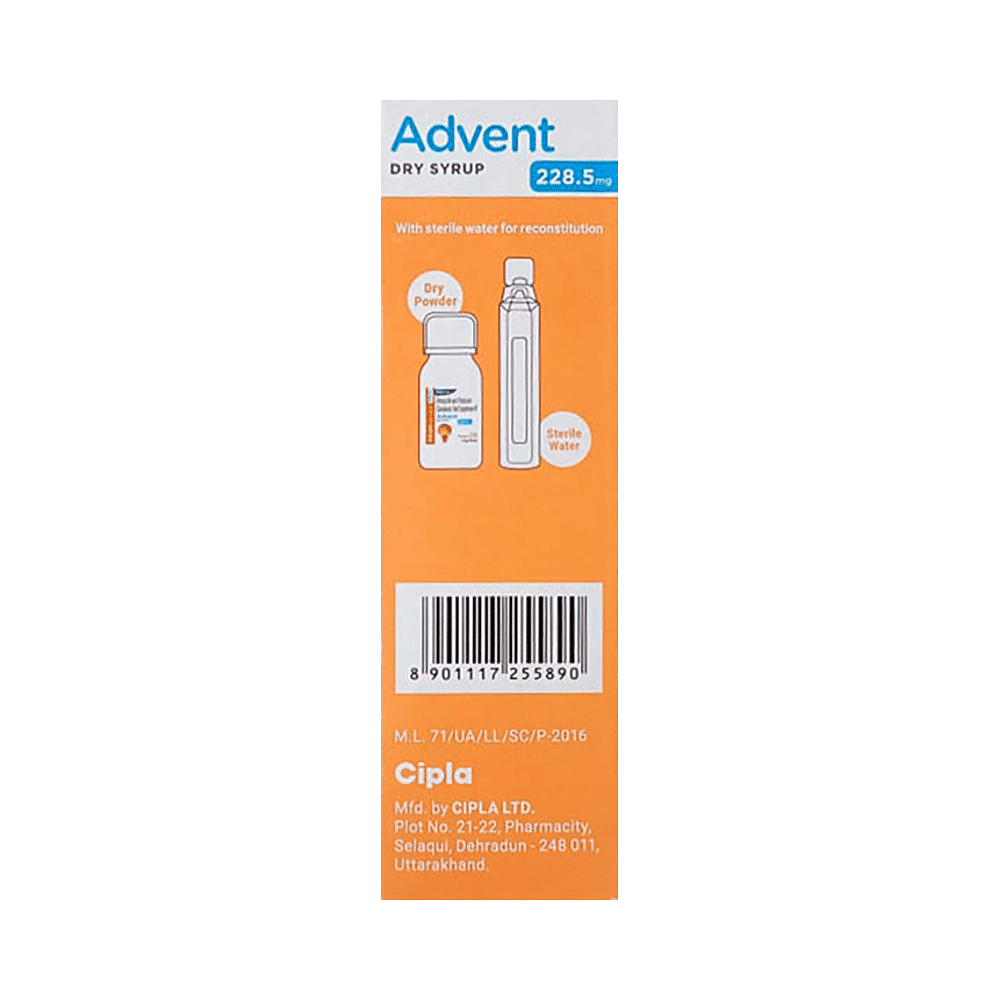
Kramox CV Dry Syrup
Manufacturer
Bluepipes Healthcare Private Limited
Salt Composition
Amoxycillin (200mg/5ml) + Clavulanic Acid (28.5mg/5ml)
Key Information
Short Description
Kramox CV Dry Syrup is an antibiotic medicine that helps treat bacterial infections of the ear, nose, throat, chest, lungs, teeth, skin, and urinary tract.
Dosage Form
Dry Syrup
Introduction
Kramox CV Dry Syrup is an antibiotic medicine that helps treat bacterial infections of the ear, nose, throat, chest, lungs, teeth, skin, and urinary tract. It is capable of killing bacteria that have become resistant to other therapies and thus also helps treat tuberculosis that is resistant to other treatments.
Directions for Use
Never give Kramox CV Dry Syrup until and unless prescribed by the doctor. You must also never share your child’s medicine with anyone else even if they show similar symptoms.
Safety Information
Side Effects
No common side effects listed.
How it works
Kramox CV Dry Syrup is an antibiotic. It has two active agents amoxycillin and clavulanic acid. Amoxycillin works by preventing the formation of the bacterial protective covering (cell wall) essential for the survival of the bacteria. Whereas clavulanic acid serves a special purpose of inhibiting an enzyme (beta-lactamase) that is produced by resistant bacteria. This makes the combination of amoxycillin and clavulanic acid an effective line of treatment for many types of infections.
Quick Tips
Never give Kramox CV Dry Syrup to treat common cold and flu-like symptoms caused by viruses. Never save medicine for future illnesses. It cannot be said whether the same medicine will work on future infections. Check ‘expiry’ before giving Kramox CV Dry Syrup to your child. Immediately discard all the expired medicines. Stop Kramox CV Dry Syrup immediately if your child develops an itchy rash facial swelling or breathing difficulty. Report to the doctor without any delay.
Related Medicines

Advent 228.5mg Dry Syrup Tangy Orange

Clav First Dry Syrup

Avunox CV Dry Syrup

Sunclav Dry Syrup

Claver Dry Syrup

Dolclav DS Dry Syrup

Cobex CL Dry Syrup

Moxidel CV Dry Syrup

Augliff Dry Syrup

Hexmox CV Dry Syrup
Frequently asked questions
Can other medicines be given at the same time as Kramox CV Dry Syrup?
When using Kramox CV Dry Syrup, inform your doctor about any other medications your child is taking. Additionally, consult with their doctor before giving any new medicine to your child.
Can I get my child vaccinated while on treatment with Kramox CV Dry Syrup?
Antibiotics like Kramox CV Dry Syrup generally do not interfere with vaccine ingredients or cause adverse reactions. However, it's recommended that children be fully recovered from their illness before receiving a vaccine.
Which lab tests may my child undergo while taking Kramox CV Dry Syrup on a long-term basis?
During prolonged therapy with Kramox CV Dry Syrup, the doctor may periodically monitor your child's kidney and liver function through laboratory tests to ensure their condition remains stable.
Can I give a higher than the recommended dose of Kramox CV Dry Syrup to my child?
Giving a higher dose of Kramox CV Dry Syrup than recommended can increase the risk of adverse effects. Consult your doctor if you notice increased symptoms or if they worsen.
Can I stop giving Kramox CV Dry Syrup to my child when the symptoms are relieved?
Continue administering the full course of treatment with Kramox CV Dry Syrup, even after symptoms improve. This ensures the infection is fully treated and prevents its return.
Can the use of Kramox CV Dry Syrup cause diarrhea?
Yes, Kramox CV Dry Syrup may cause diarrhea due to its antibiotic properties, which can disrupt beneficial bacteria in your child's stomach. Encourage plenty of fluid intake and consult your doctor if symptoms persist.
Do all viral common colds result in secondary bacterial infection?
No, most viral infections do not lead to bacterial infections. Using antibiotics for viral infections can increase the risk of side effects. Consult with a doctor before administering antibiotics.
The mucus coming out of my child's nose is yellow-green. Is it a sign of a bacterial infection?
Yellow or green mucus in the nose does not necessarily indicate the need for antibiotics, as this can be a normal response to a viral cold. Symptoms usually last 7-10 days.
Is there any sign which shows that my child needs immediate medical attention?
Seek immediate medical attention if your child experiences serious allergic reactions (breathing difficulties, skin rashes), gastrointestinal infections (diarrhea), or liver damage (weakness, paleness, vomiting).


